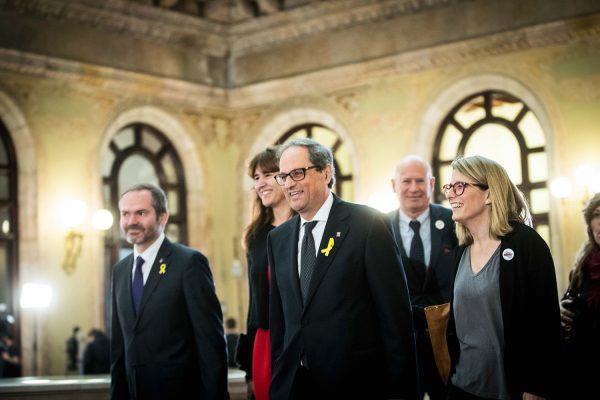
Catalan president Quim Torra’s suspension as a parliamentarian has divided the Spanish region’s ruling separatists.
In a session of the regional parliament on Monday, Speaker Roger Torrent of the Republican Left warned Torra, who leads the center-right Together for Catalonia, that his vote would not be counted in accordance with a ruling by the Spanish electoral commission. The entire Together for Catalonia delegation then abstained from all parliamentary business in protest.
The electoral commission has ordered Torra to step down as lawmaker for violating regulations on political neutrality. During the last election, he refused to remove a banner from his government’s palace in Barcelona that called for the release of nine separatists who were imprisoned for leading a failed breakaway from Spain in 2017. Among them is the Republican Left party leader, Oriol Junqueras.
Torra argued only the Catalan parliament can remove him. Its presidium has now sided with the electoral commission, although it believes Torra can continue to serve as president. Torra is appealing the electoral commission’s decision to the Supreme Court in Madrid, but it is unlikely to rule in his favor.
Role reversal
The dispute marks a role reversal for the two independence parties.
As recently as four years ago, Together for Catalonia, then called Democratic Convergence of Catalonia, was more moderate. It gradually shifted from pro-autonomy to pro-independence when public support for secession rose and the Spanish government, then led by the conservative People’s Party, refused to make concessions.
Now the Republican Left, which has always supported Catalan independence, is working with a new, left-wing Spanish government to transfer more power to the region. Although its long-term goal is still to break away from Spain, its priority is to deescalate the institutional standoff between the governments in Barcelona and Madrid. Refusing to comply with the electoral commission’s ruling could put that deescalation at risk.
Prime Minister Pedro Sánchez of the Spanish Socialist Party has stuck his neck out by agreeing to negotiate with the separatists. The right calls him a “traitor” for merely sitting down with them. Only half of his own voters support talks.
Early election
The outcome could be early elections in Catalonia, which polls suggest the Republican Left would win. Its support is up from 21 percent in 2017 to 22-25 percent. The party received 23 percent support from Catalans in the last general election.
Together for Catalonia is projected to fall from 22 to 13-19 percent.
The far-left Popular Unity Candidacy, which backs the two larger independence parties in parliament but is not part of the government, would go up from 4.5 to 6-10 percent.
The three would still have a majority, but so would the Republican Left in combination with the Catalan Socialists and the left-wing Catalonia in Common and Podemos (We Can). Such a coalition would mirror the national government, which could make it easier for the Socialists and Republicans to negotiate and pass a new autonomy settlement.
